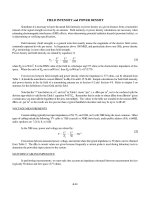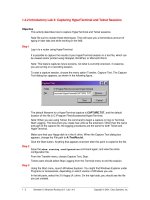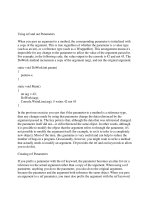Tài liệu MEDIA, TECHNOLOGY, AND INFORMATION LAW doc
Bạn đang xem bản rút gọn của tài liệu. Xem và tải ngay bản đầy đủ của tài liệu tại đây (156.53 KB, 6 trang )
MEDIA,
TECHNOLOGY,
AND
INFORMATION
LAW
Yale Law School
Yale Law School has long focused on the intersection of media,
technology, information, and the law. Under the umbrella of the
Information Society Project, founded by Professor Jack Balkin in 1997,
Yale Law School has eight different paths for involvement in media,
technology, and information law.
Yale is home to the top First Amendment scholars in the country, and
numerous faculty members who write about privacy law. In addition,
ISP resident fellows work on issues ranging from patenting the human
genome to location tracking, and go on to become top scholars in
their fields.
Beyond the academic year, Yale Law students spend their summers at
public interest organizations like the ACLU and the Electronic Frontier
Foundation (EFF), and work with legal teams at newspapers. After
graduation, they place at top firms, where a strong network of Yale
graduates work in media law and related fields, and at public interest
organizations or journalistic institutions like The New York Times.
MEDIA, TECHNOLOGY,
AND INFORMATION
LAW
Yale Law School
Visual Law Project
The Yale Visual Law Project produces short
documentary films on legal issues to advance
public debate.
•Education.TheVisualLawProjectruns
a year-long practicum at the Information
Society Project at Yale Law School that trains
law students in the art of visual advocacy —
making effective arguments through film.
•Innovation.Theprojectexploresthe
intersection between law and film through
multidisciplinary workshops, discussions
with renowned guest speakers, and hands-
on production.
•Advocacy.Theprojectproducesintellectu-
ally stimulating and well-researched films
grounded in the stories of people who live
out the consequences of the law.
•Community.Theprojectispartofarising
community of students, lawyers, and
filmmakers invested in visual advocacy.
Courses
The Law School curriculum includes a number
of courses related to law and media. In addition,
lawstudentsmaytakecoursesatYaleCollege,
often for credit toward their degree. While not all
coursesaretaughteachsemester,someexamples
include:
AccesstoKnowledgePracticum
CommunicationsLaw
Cyberlaw
FirstAmendment
Introduction to Intellectual Property
Information Privacy Law
Internet Privacy
MediaFreedomandInformationAccessClinic
Media Law
TheLawofE-commerce
The Information Society
Project (ISP)
The Information Society Project is an intel-
lectual center addressing the implications of
the Internet and new information technologies
for law and society, guided by the values of
democracy, development, and civil liberties.
The ISP brings together students, scholars,
activists, and policymakers to define the
problems and identify the solutions on topics
stemming from the interplay between memes,
genes, and bits in our contemporary informa-
tion society. The ISP produces scholarship,
teaches, engages in activism, and develops and
spreads ideas addressing key research areas:
•
Access to Knowledge (A2K): Protecting and
expandingaccesstoknowledgetosecure
broader participation in cultural, civic,
and educational affairs, helping realize
the benefits of scientific and technological
advancement, and inspiring innovation,
development, and social progress across
the globe.
•
Civil Liberties Online: Developing legal
rules, policy frameworks, and technical
architectures to promote civil liberties
online, including the preservation of privacy,
freedom of speech, and individual liberty
online.
•
Digital Education: Providing teachers and
students with better access to digital educa-
tion through the development of norms,
policies and regulations that promote the
best use of technological resources in educa-
tion – giving educators the access they need
to digital information, while at the same time
protecting content producers.
•
Law and Genomics:Addressingthecomplex
legal, social, ethical, and policy impacts of
the genomic revolution, including outlining
the benefits and harms created by intel-
lectual property and patent claims on
biological entities.
•
Intellectual Property:Encouragingintel-
lectual property reform and innovation,
includingexpandingtherecognitionof
exceptionsandlimitationstoIP,andthe
creation of innovative technological and
legal alternatives to strict intellectual prop-
erty regimes.
Knight Law and Media
Program (LAMP)
The Law and Media program is directed toward:
•
Yale Law School students who plan to be
journalists, advocates for journalists, policy
makers, or leaders in the media industry;
•
working journalists who seek a deeper under-
standing of law, media, and policy;
•
scholars who study cutting-edge issues of law
and media.
The Law and Media Program is open to all Yale
Law School students. The program includes
courses related to law and media; writing
workshops; speakers, conferences and events;
and career counseling and support for summer
internships.
Student Clinic
TheMediaFreedomandInformationAccess
(MFIA)Clinic’smissionistwofold:tosupport
a robust investigative role for news organi-
zationsandtopreservethepublic’srightof
access to information, thereby ensuring a well-
informed public sphere.
Students in the clinic, under the direction of their
supervising attorneys, are chiefly responsible
for research, drafting of legal documents, and
appearing in court to argue on behalf of clients.
more >
Initsshortlife,MFIAhasgarneredanimpres-
sive string of victories for journalists and on
behalf of the public interest at both the state
and federal levels.
Student Fellowships
The ISP student fellowship is intended
for current Yale Law School J.D. or LL.M.
candidates who are strongly interested in any
of the following areas: Internet and telecom-
munications law, intellectual property law,
accesstoknowledge,FirstAmendmentlaw,
media studies, privacy, cybercrime, cybersecu-
rity, social software, standards and technology
policy, cultural evolution, bioethics, biotech-
nology, and law and technology generally.
Student fellows frequently engage with other
ISP faculty and fellows, participate in ISP
events, and author ISP-sponsored research.
Aftergraduation,ISPstudentfellowshave
become prominent law and technology
academics, served in government, become
policy activists in public interest organizations,
and founded Internet startups. ISP fellows
also become part of a network of affiliated ISP
fellows around the world.
The Floyd Abrams Institute for
Freedom of Expression
TheFloydAbramsInstituteforFreedom
ofExpressionatYaleLawSchoolpromotes
freedom of speech, freedom of the press,
and access to information as informed by the
values of democracy and human freedom.
TheAbramsInstituteismadepossibleby
agenerousgiftfromFloydAbrams,oneof
thecountry’sleadingexpertsinfreedomof
speech and press issues, who both gradu-
ated from and has taught at Yale Law School.
TheInstitute’smissionisbothpracticaland
scholarly. It includes a clinic for Yale Law
students to engage in litigation, draft model
legislation, and advise lawmakers and policy
makers on issues of media freedom and infor-
mational access. It promotes scholarship and
law reform on emerging questions concerning
both traditional and new media. The Institute
also holds scholarly conferences and events at
YaleonFirstAmendmentissuesandonrelated
issues of access to information, Internet and
media law, telecommunications, privacy, and
intellectual property.
The Program for the Study of
Reproductive Justice
The Program for the Study of Reproductive
Justice is designed to focus scholarly atten-
tion on issues of reproductive justice, and to
encourage new scholarship and the devel-
opment of new scholars in this field. The
program focuses on a wide range of issues
concerning the intersections between repro-
ductive justice, health policy, information
policy and technology policy, including: the
legal and policy implications of new reproduc-
tive technologies, the relationship between
reproductivelibertyandsexequality,andthe
intersections between reproductive justice
and health policy, privacy concerns, and the
regulation and dissemination of informa-
tion relevant to reproductive freedoms. By
utilizing the resources and guidance provided
by the Information Society Project at Yale
Law School, the Program for the Study of
Reproductive Justice is building the capacity
of the legal academy to develop new ideas that
promote justice with respect to reproductive
issuesandexplorenewquestionsaboutwhat
policies and practices best promote reproduc-
tive justice.
Yale Law School
OfficeofAdmissions
127 Wall Street
NewHaven,Connecticut06511
www.law.yale.edu
Printed2012
For more information on media, technology
and information law at Yale Law School,
please visit our websites at www.law.yale.edu/isp
and www.law.yale.edu/lawandmedia.









